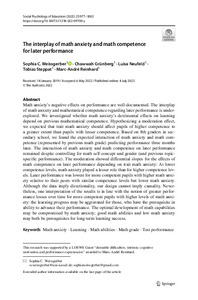| dc.date.accessioned | 2022-09-29T09:48:21Z | |
| dc.date.available | 2022-09-29T09:48:21Z | |
| dc.date.issued | 2022-07-04 | |
| dc.identifier | doi:10.17170/kobra-202209296908 | |
| dc.identifier.uri | http://hdl.handle.net/123456789/14165 | |
| dc.description.sponsorship | Gefördert im Rahmen des Projekts DEAL | ger |
| dc.language.iso | eng | |
| dc.rights | Namensnennung 4.0 International | * |
| dc.rights.uri | http://creativecommons.org/licenses/by/4.0/ | * |
| dc.subject | math anxiety | eng |
| dc.subject | learning | eng |
| dc.subject | math abilities | eng |
| dc.subject | math grade | eng |
| dc.subject | test performance | eng |
| dc.subject.ddc | 150 | |
| dc.subject.ddc | 370 | |
| dc.title | The interplay of math anxiety and math competence for later performance | eng |
| dc.type | Aufsatz | |
| dcterms.abstract | Math anxiety’s negative effects on performance are well-documented. The interplay of math anxiety and mathematical competence regarding later performance is underexplored. We investigated whether math anxiety’s detrimental effects on learning depend on previous mathematical competence. Hypothesizing a moderation effect, we expected that trait math anxiety should affect pupils of higher competence to a greater extent than pupils with lesser competence. Based on 8th graders in secondary school, we found the expected interaction of math anxiety and math competence (represented by previous math grade) predicting performance three months later. The interaction of math anxiety and math competence on later performance remained despite controlling for math self-concept and gender (and previous topic-specific performance). The moderation showed differential slopes for the effects of math competence on later performance depending on trait math anxiety: At lower competence levels, math anxiety played a lesser role than for higher competence levels. Later performance was lowest for more competent pupils with higher math anxiety relative to their peers with similar competence levels but lower math anxiety. Although the data imply directionality, our design cannot imply causality. Nevertheless, one interpretation of the results is in line with the notion of greater performance losses over time for more competent pupils with higher levels of math anxiety: the learning progress may be aggravated for those, who have the prerequisite in ability to advance their performance. The optimal development of math capabilities may be compromised by math anxiety; good math abilities and low math anxiety may both be prerequisites for long-term learning success. | eng |
| dcterms.accessRights | open access | |
| dcterms.creator | Weissgerber, Sophia Christin | |
| dcterms.creator | Grünberg, Chawwah | |
| dcterms.creator | Neufeld, Luisa | |
| dcterms.creator | Steppat, Tobias | |
| dcterms.creator | Reinhard, Marc-André | |
| dc.relation.doi | doi:10.1007/s11218-022-09700-y | |
| dc.subject.swd | Mathematikunterricht | ger |
| dc.subject.swd | Angst | ger |
| dc.subject.swd | Lernen | ger |
| dc.subject.swd | Schulleistungsmessung | ger |
| dc.subject.swd | Lernerfolg | ger |
| dc.type.version | publishedVersion | |
| dcterms.source.identifier | eissn:1573-1928 | |
| dcterms.source.issue | Issue 4 | |
| dcterms.source.journal | Social Psychology of Education | eng |
| dcterms.source.pageinfo | 977-1002 | |
| dcterms.source.volume | Volume 25 | |
| kup.iskup | false | |


